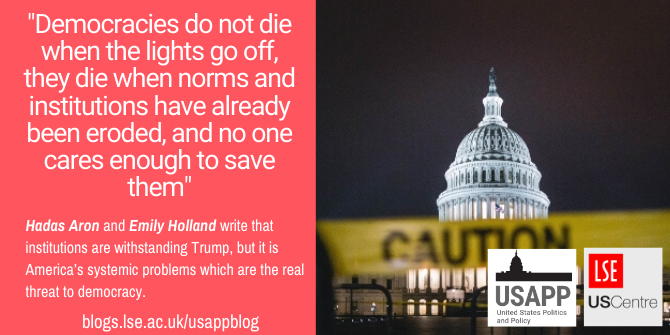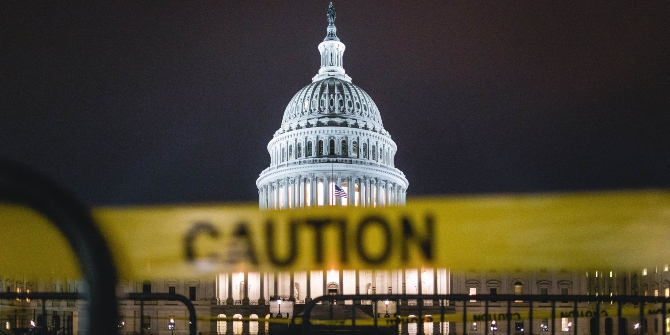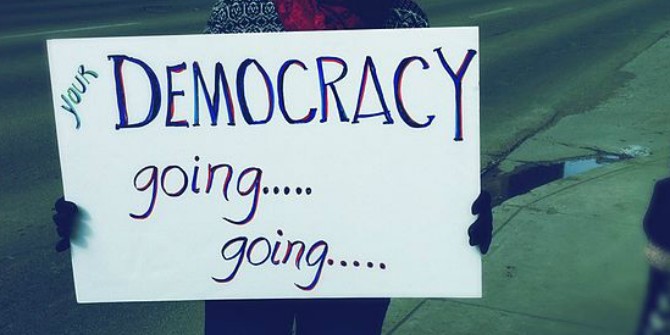
 Since Donald Trump’s election in 2016, there has been growing concern among commentators over the apparent erosion of US institutions and democratic norms, with some drawing comparisons with interwar Europe and current day Eastern Europe, Latin America, and Turkey. But, write Hadas Aron and Emily Holland, the ongoing impeachment hearings and the robustness of the Supreme Court illustrate the robustness of US institutions. The real threats to democracy in America, they argue, such as mass incarceration, political polarization, and inequality, are much more systemic and long term.
Since Donald Trump’s election in 2016, there has been growing concern among commentators over the apparent erosion of US institutions and democratic norms, with some drawing comparisons with interwar Europe and current day Eastern Europe, Latin America, and Turkey. But, write Hadas Aron and Emily Holland, the ongoing impeachment hearings and the robustness of the Supreme Court illustrate the robustness of US institutions. The real threats to democracy in America, they argue, such as mass incarceration, political polarization, and inequality, are much more systemic and long term.
As the Democrat-led impeachment inquiry unfolds in Washington, there is growing and understandable concern about the erosion of governing institutions and liberal democratic norms. Since 2016, scholars have addressed the prospect of Donald Trump’s threat to American democracy, as well as the threat of other populists in Western Europe. To support their arguments, these authors (Levitsky and Ziblatt and Timothy Snyder are just two examples) often draw on examples of other cases of democratic decline including interwar Europe, current day Eastern Europe, Latin America, and Turkey. There is no doubt that Western democracy is facing a serious challenge. But as we have written before, comparing the American experience to cases of democratic decline in relatively new democracies is unhelpful. This comparison is problematic not only because it is too alarmist, but also because it is analytically flawed, and misidentifies the greatest challenges facing American democracy today: race relations, severe inequality and extreme societal polarization.
One lesson that scholars draw on from previous cases is that democracies often collapse through the democratic process itself. One example of this is the democratic election of leaders with authoritarian tendencies, who once in power make legal changes that empty democracy from its meaning or abolish it altogether. This was the case in Weimar Germany once Hitler was appointed, but more recently this has occurred with the elections of Viktor Orbàn in Hungary, Hugo Chavez in Venezuela and Recep Erdoğan in Turkey.
Many of these leaders’ policies appear at first glance comparable to current Trump administration policies. First, most populists share a strikingly similar rhetorical style: they demonize political rivals, the media, and the establishment, incite hatred toward minorities, and spew conspiracy theories. Second, the politicization of the courts, a disturbing process in the US, also played a part in some cases of democratic backsliding including Hungary and Poland, where the constitutional courts were very active and widely perceived as an unelected political actor. In these cases, the current leaders’ first policy priority was taking over the courts and thus diminishing checks and balances. In the US, the Republican Party has targeted the courts for many years. Senate majority leader Mitch McConnell has made the transformation of the role of the court a through line of his career, achieving real success when he blocked the confirmation of Obama nominees in the Senate, and then accelerated confirmations after Trump took office. Finally, in democratic systems, rule of law norms are just as important as codified law. Donald Trump violated established norms throughout his candidacy, campaign and after his election, and there is justified concern that this flagrant disregard for rule of law norms will erode rule of law practices and thus the liberal democratic system on which it relies.
However, despite these similarities, all these processes pose less of a threat to American democracy than they do to weak or new democracies. One reason pieces like Levitsky & Ziblatt’s How Democracies Die have gotten so much traction in the popular media is that they draw attention to and generate resistance against the corruption of our political discourse and the violation of rule of law norms. The logic behind this is that democracies die in the dark, when no one is paying attention, and these works shed a spotlight on threatening actions. But one key difference between contemporary US politics and interwar Europe is that, as evidenced by this week’s public impeachment hearings, the lights are on in Washington, as well as many other places. In some countries, this is not enough to stop the erosion of democratic practices because, as we wrote last week, there is significant public sentiment against certain aspects of liberal democracy. In the US, publicizing the actions of our leaders matters a great deal, as leaders are met with resistance from within the political and bureaucratic system as well as from the public. Democracies do not die when the lights go off, they die when norms and institutions have already been eroded, and no one cares enough to save them.

Photo by Andy Feliciotti on Unsplash
In young or institutionally weak democracies like Hungary and Turkey, leaders were able to dismantle oversight institutions very rapidly once in office. The fragility of these institutions was not entirely shocking to observers, they had only recently been put in place and norms around their role had not yet crystallized. Had the Trump administration immediately dismantled the Supreme Court or dismissed its judges, public outcry would have been enormous and this would indeed have been a shocking turn of events. We recognize that these practices are a real threat in democracies without a long liberal tradition, and a societal struggle between liberalism and other forms of rule. While the Trump Administration’s attempts to bring the Justice Department under his direct control and politicize the courts are troubling, they are not the main threat to American democracy.
This is not to say that American democracy is safe. Scholars have pointed out serious threats to American liberal democracy for years, and it is largely because of these serious flaws that illiberal leaders like Donald Trump have had such success around the world. US income inequality is the highest it has been in fifty years, and was significantly higher in 2018 than it was in 2017. Race relations and systemic inequality are longstanding problems, as are the related issues of mass incarceration and legal system disparities. Extreme polarization of society and of political parties leads to deadlock in Congress, and to the politicization of the Supreme Court when congress cannot legislate. Fixating on Trump is hard to avoid but takes attention away from the systemic problems that brought him to office. While he does flout democratic norms daily, and stokes the flames of societal discontent, he is merely a representation of the underlying problem. While America’s problems are deep and systemic, its democratic institutions are robust, and thus generating comparisons to young democracies with fragile institutions does not do the problem justice. Resistance to Trumpian policies is a short-term solution to a very long-term problem.
Please read our comments policy before commenting.
Note: This article gives the views of the author, and not the position of USAPP – American Politics and Policy, nor of the London School of Economics.
Shortened URL for this post: http://bit.ly/2QG3olQ
About the authors
 Hadas Aron – New York University
Hadas Aron – New York University
Hadas Aron is a Faculty Fellow at the Center for European and Mediterranean Studies at New York University, specializing on populism, nationalism and democracy.
 Emily Holland – United States Naval Academy
Emily Holland – United States Naval Academy
Emily Holland, an Assistant Professor at the United States Naval Academy, specializing on Russian foreign policy, populism and corruption.






